Borbála was born at 32 weeks of pregnancy, weighing 1900 grams. She is now almost two months old, a strong, agile baby, gaining weight and developing well, according to her mother. Borbála was the first newborn to undergo in utero surgery under fetal anesthesia at the Department of Obstetrics and Gynecology of Semmelweis University.
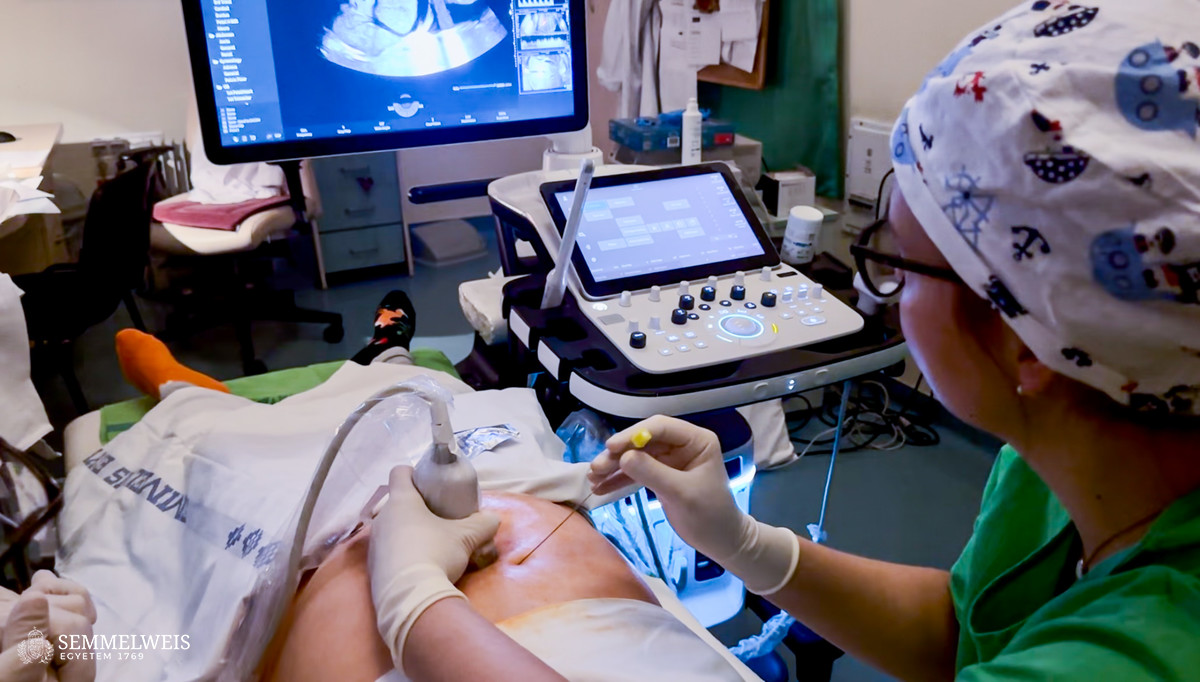
Because the mother’s body produced antibodies against the baby’s blood type, by week 28 the 1200-gram fetus was so severely anemic that only by administering blood transfusion was it possible to avoid an immediate cesarean section. Blood can also be given through the umbilical cord, which in Hungary has been done several times already in Pécs. In this case, however, the procedure was not feasible due to the location of the placenta. There was only one solution, which was to administer the blood directly into the abdominal vein of the fetus, explained Dr. Zsófia Benkő, Assistant Professor at the department, who had previously acquired the necessary knowledge during a two-year training course in London.
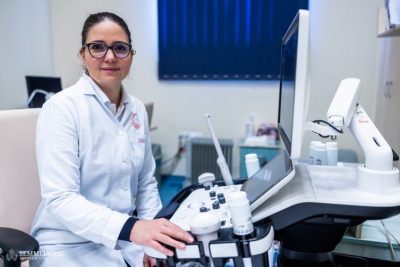 The first step of the procedure, which is a pioneering one in Hungary but has been performed internationally for a long time, was to help the fetus into the correct position in utero, and then inject the anesthetic and analgesic drug cocktail into its thigh with a special needle. Subsequently, it was possible to start the blood transfusion procedure itself by puncturing a vein 5-6 mm in diameter in the fetal liver to allow the blood product to enter the fetal circulation. The operation was ultrasound-guided, which allowed the team to monitor the condition of the anesthetized fetus continuously, Dr. Zsófia Benkő said.
The first step of the procedure, which is a pioneering one in Hungary but has been performed internationally for a long time, was to help the fetus into the correct position in utero, and then inject the anesthetic and analgesic drug cocktail into its thigh with a special needle. Subsequently, it was possible to start the blood transfusion procedure itself by puncturing a vein 5-6 mm in diameter in the fetal liver to allow the blood product to enter the fetal circulation. The operation was ultrasound-guided, which allowed the team to monitor the condition of the anesthetized fetus continuously, Dr. Zsófia Benkő said.
Meanwhile, the mother was able to follow the procedure continuously via the monitor.
I am extremely grateful that the clinic and the doctor decided to go ahead with this. We knew that this was the first procedure of its kind in the country, but we felt we had nothing to lose, that we had to give our baby every chance to develop in utero and not be born anemic at 1200 grams.
— the mother told our website.
The blood transfusion was repeated after two weeks, which made it possible to keep the baby in the womb for a total of 4 additional weeks. “In such a situation, even days are worth fighting for, the chances of complication-free survival increase with every day spent in utero, and four weeks mean life itself,” Dr. Zsófia Benkő pointed out.
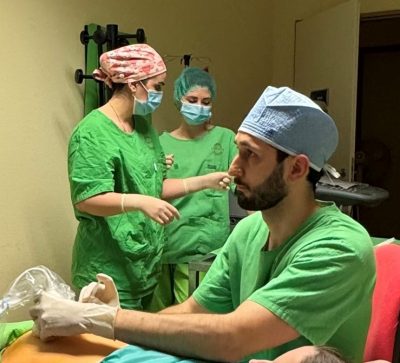
The first successful in utero procedure under anesthesia has since been followed by eight more, including several blood transfusions and the drainage of fluid accumulated in the abdomen. The latter was performed by Dr. Gergő Leipold – who is in charge of the field of fetal medicine at the Üllői street section of the department – and Dr. Petra Merkely. This was the first intervention of this kind in the section, which was greatly assisted by other section members who participated in the working group: Dr. Csaba Demendi, Dr. Leila Tighargar, Dr. Lotti Keszthelyi and Dr. Vanda Hermányi-Csiki, emphasized Dr. Gergő Leipold.
Performing an intervention on the fetus is worthwhile in the case of underlying diseases that can be treated after birth, yet the intrauterine procedure helps to ensure that the fetus is born viable, Dr. Zsófia Benkő explained.
In addition to severe anemia caused by antibody production or a virus (e.g. fifth disease in pregnant women), such conditions can be induced by diseases of the lymphatic system, for example. These can result in large amounts of fluid accumulating between the pleural plates and prevent the lungs from developing. Intrauterine surgery can be used to drain the fluid by inserting a needle of about half a centimeter through the mother’s abdomen and uterus and then implanting a shunt to prevent a new build-up of secretions. The lungs can then develop properly, and the metabolic disease can be treated after birth. Likewise, if a blockage in the urinary tract or a narrowed urethra prevents the fetus from passing urine, this will destroy the kidneys by the time it is born. Intrauterine surgery can solve this problem as well by inserting a shunt, and after birth, the urethra can be easily dilated.
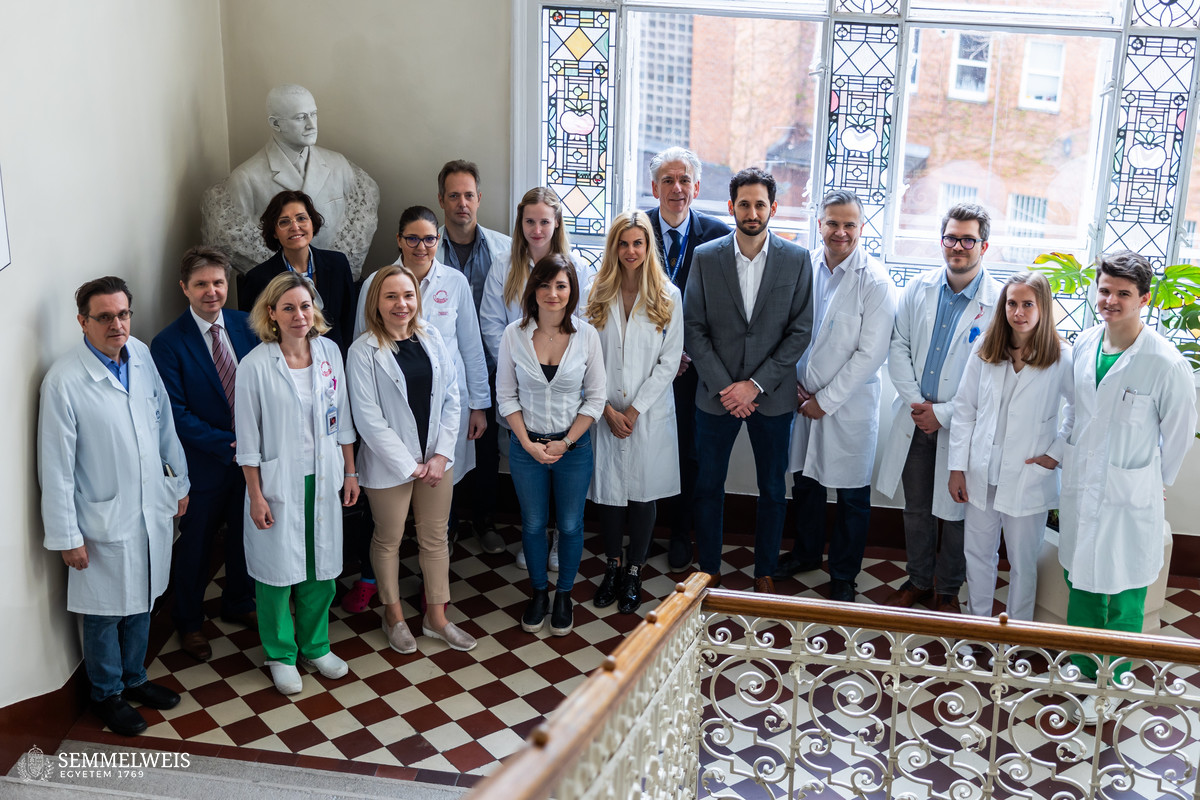
The Fetal Medicine Working Group was established in January at the Department of Obstetrics and Gynecology of Semmelweis University, with the aim of protecting fetuses, helping fetuses growing inside a uterus affected by a medical condition and performing the necessary intrauterine interventions. The formation of the group was initiated by Dr. Zsófia Benkő, who – together with Dr. Gergő Leipold, a specialist at the Üllői street section of the department – previously obtained an internationally recognized diploma in fetal diagnostics at the Fetal Medicine Centre of the Fetal Medicine Foundation in London, headed by the world-renowned Professor Kypros Nicolaides. The Greek Cypriot-born professor is the founder of fetal medicine and, as he said in the relevant episode of the documentary series The Surgeon’s Cut, has dedicated his life to understanding how to save the fetus in situations where it would otherwise die.
Dr. Zsófia Benkő says it was while working with the professor that she experienced the miracle of helping a pregnant woman’s fetus and giving it a new chance at life, which was a truly uplifting feeling. For Dr. Gergő Leipold, this period was also very formative; he says that the spirit the professor represents has been his guiding light ever since.
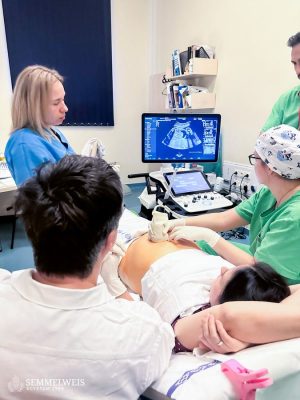
Regarding the first intervention of this kind performed in Hungary – which took place in the Baross street section of the department – Dr. Zsófia Benkő remarked: it is very exciting and difficult to perform a new intervention, even if we have a lot of experience in the sub-processes. Not only does one have to control the whole process and puncture the fetus without any mistakes, but one has to do it in a way that is not unpleasant for the pregnant woman. “The day before the procedure, I practiced all day on a model I had made from a whole chicken bought at a shop to ensure that both punctures were perfect. My colleagues and I rehearsed the procedure several times, like a stage play, so that we were thoroughly prepared for the real thing. Unfortunately, due to the condition of the fetus, we only had two days to plan the intervention and consult with the Hungarian National Blood Transfusion Service to give them time to prepare the special blood product for us. We could not have done this without such a fantastic, professional, and enthusiastic team,” she said.
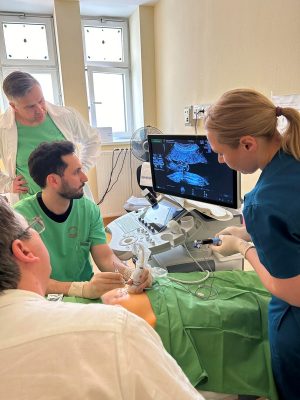
Dr. Gergő Leipold highlighted the importance of the fact that in the joint working group of the two sections of the department, besides obstetricians and gynecologists, there are also renowned representatives of other professions (e.g. fetopathologists Dr. Tamás Gyula Marton and Mrs. Dr. Tamás Gyula Marton). Their work is of great help in increasing the knowledge of fetal medicine and expanding the range of procedures.
Dr. Petra Merkely, who works directly with Dr. Gergő Leipold at the Üllői street section in the field of interventions in fetal medicine, added that their aim was to launch research in this field at an international level. Several colleagues have previously worked at the Fetal Medicine Centre in Birmingham, and their experience and contacts provide a good basis for this.
Dr. Zsófia Benkő emphasized that both sections of the department welcome pregnant women from all over the country who have a fetal emergency for which intrauterine interventions can be a solution. The aim of the working group is to gain as much experience as possible and, in the long term, introduce a range of fetal surgery procedures (such as diaphragmatic hernia or open spine surgery) that are not yet available in the country.
In addition, they would like to introduce fetoscopic laser coagulation in Budapest, already available in Pécs, which is also used in utero for twin-twin transfusion syndrome, but without anesthesia.
Pálma Dobozi
Translation: Dr. Balázs Csizmadia
Photos: Bálint Barta — Semmelweis University; featured image: iStock


